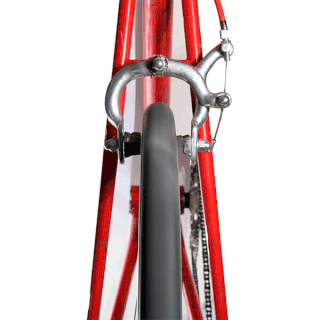
A bicycle brake reduces the speed of a bicycle or prevents it from moving. The three main types are: rim brakes, disc brakes, and drum brakes.

A bicycle frame is the main component of a bicycle, onto which wheels and other components are fitted. The modern and most common frame design for an upright bicycle is based on the safety bicycle, and consists of two triangles: a main triangle and a paired rear triangle. This is known as the diamond frame. Frames are required to be strong, stiff and light, which they do by combining different materials and shapes.

A bicycle wheel is a wheel, most commonly a wire wheel, designed for a bicycle. A pair is often called a wheelset, especially in the context of ready built "off the shelf" performance-oriented wheels.

A derailleur is a variable-ratio bicycle gearing system consisting of a chain, multiple sprockets of different sizes, and a mechanism to move the chain from one sprocket to another. Although referred to as gears in the bike world, derailleurs are technically sprockets since they drive or are driven by a chain, and are not driven by one another.
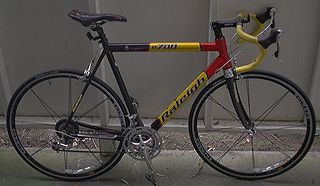
A racing bicycle, also known as a road bike is a bicycle designed for competitive road cycling, a sport governed by and according to the rules of the Union Cycliste Internationale (UCI).

A bicycle fork is the part of a bicycle that holds the front wheel.

The Birdy is a folding bicycle designed by Riese und Müller in Germany and produced by Pacific Cycles in Taiwan. As of 2010 over 100,000 had been sold. Three distinct models have been marketed, in addition to some specialist variations, with the third (Mk3) introduced in July 2015.

A bicycle lock is a security device used to deter bicycle theft, either by simply locking one of the wheels or by fastening the bicycle to a fixed object, e.g., a bike rack.
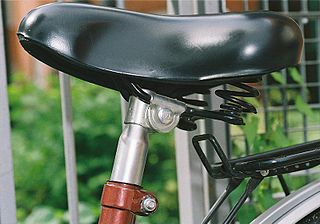
A bicycle seatpost, seatpin, saddlepole, saddle pillar, or saddle pin is a tube that extends upwards from the bicycle frame to the saddle. The amount that it extends out of the frame can usually be adjusted, and there is usually a mark that indicates the minimum insertion. Seatposts can be made of steel, aluminum, titanium, carbon fiber, or aluminum wrapped in carbon fiber.

Brompton Bicycle is a British manufacturer of folding bicycles based in Greenford, London.

Bicycle gearing is the aspect of a bicycle drivetrain that determines the relation between the cadence, the rate at which the rider pedals, and the rate at which the drive wheel turns.

The A-bike is a folding bicycle released by Sir Clive Sinclair in the United Kingdom on 12 July 2006. It was designed by Hong Kong design agency Daka, in collaboration with Sinclair Research, over a 5-year period. It was announced to the public in 2004. Clive Sinclair envisioned the A-bike, and Alex Kalogroulis was the main designer. It weighs 5.7 kilograms (13 lb) and folds to 67×30×16 centimetres (26.4×11.8×6.3 in), small enough to fit in a rucksack. The first version had 6-inch (15 cm) wheels, which was increased to 8 inches (20 cm) in later models. In 2015, an electric version, the A-Bike Electric, was introduced to the public as part of a Kickstarter campaign.
A portable bicycle is a bicycle that has been designed to be small and light enough for easy carrying. It is usually dismantled to make a convenient bundle and the frame often has a folding action to facilitate this. The design of a portable bicycle involves a trade-off between ease of carrying and ease of riding.
Dahon is the world's largest manufacturer of folding bicycles with a two-thirds marketshare in 2006. The company was founded in 1982 by David T. Hon, a former laser physicist, and is headquartered in Los Angeles, California, with assembly factories in China, Macau and Bulgaria. Dahon markets bicycles under its own name as well as other brand names, including the affiliated Yeah and Biceco Brands, and Novara for REI in the U.S. The company is a member of the Global Alliance for EcoMobility. Dahon holds over 200 patents, some having become industry standards.

A bicycle handlebar is the steering control for bicycles. It is the equivalent of a tiller for vehicles and vessels, as it is most often directly mechanically linked to a pivoting front wheel via a stem which in turn attaches it to the fork. Besides steering, handlebars also often support a portion of the rider's weight, depending on their riding position, and provide a convenient mounting place for brake levers, shift levers, cyclocomputers, bells, etc.
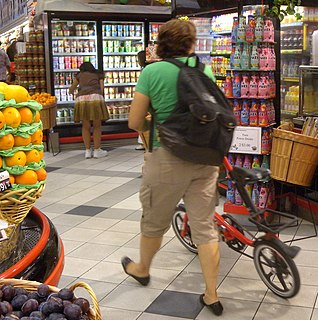
Small-wheel bicycles are adult bicycles that have wheels of 20 inch nominal diameter or less, which is smaller than the 26", 27.5", 29" or 700c sizes common on most full-sized adult bikes. While many folding bicycles are small-wheel bicycles, not all small-wheel bicycles can fold. Some small-wheel bicycles neither fold nor separate, such as the Moulton, which comes in both fixed-frame and separable-frame versions. While BMX bikes also have 20" wheels, they are not normally categorised as "small-wheel bikes".

A folding bicycle is a bicycle designed to fold into a compact form, facilitating transport and storage. When folded, the bikes can be more easily carried into buildings, on public transportation, and more easily stored in compact living quarters or aboard a car, boat or plane.
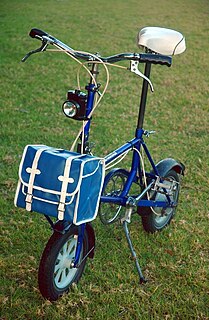
The Bootie Folding Cycle, or 'Bootie', is a rare folding bicycle produced in West Yorkshire UK from 1965 to 1973.


















